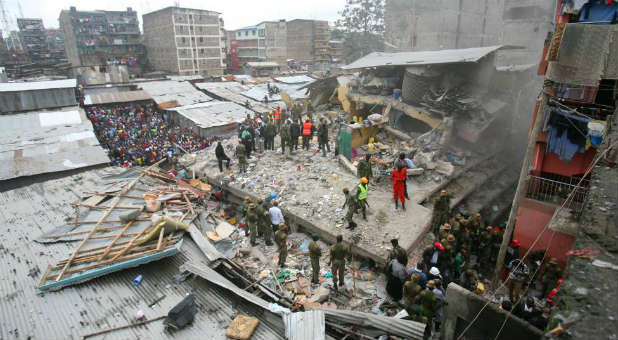Rescue workers pulled a six-month-old baby girl out of the rubble of a building in Kenya’s capital on Tuesday and reunited her with her father, more than three days after it collapsed following days of heavy rain.
At least 23 people have so far been confirmed dead after the six-storey residential block in Nairobi’s poor Huruma district crumbled on Friday night. Police are questioning the owners after President Uhuru Kenyatta ordered them detained.
“The child, who had been buried for about 80 hours, was found in a bucket wrapped in a blanket. She appeared dehydrated, and with no visible physical injuries,” the Kenya Red Cross said in a statement.
The baby, named as Dealeryn Saisi Wasike, was identified by her father after she was taken to hospital for treatment, the Red Cross said. A Red Cross official said the fate of her mother was still not clear.
The collapse of the building was the latest such disaster in a fast expanding African city that is struggling to build homes fast enough.
Like many other cities in Africa, the population of Nairobi has climbed dramatically in recent years. The Kenyan capital had almost 3.5 million people in 2011, about a third bigger than a decade earlier, according to U.N. figures.
Governments have struggled to provide basic infrastructure and bureaucratic processes to ensure planning rules are met.
Many Kenyans who come to the city in search of work end up in one of several slums, such as Kibera, made up of makeshift homes of wood and corrugated iron sheets.
Others live in slightly better off but still poor districts, like Huruma, where concrete buildings have risen rapidly amid potholed roads and ropey power supplies. Heavy rains have caused other collapses in Nairobi but without such high death tolls.
The Interior Ministry said the Huruma building had been earmarked for demolition as it was built close to a river, but the order had not been carried out by local officials. It urged developers to adhere to safety standards.
After visiting the site on Saturday, Kenya’s president ordered other buildings to be surveyed to ensure they were safe.
Rescue workers had said on Monday that the chances of finding more survivors was unlikely.
Nairobi County police commander Japheth Koome told Reuters the death toll stood at 23 while 136 people had been saved from the wreckage. He said the number of deaths could rise as the search continued.
Dozens of other people are still listed as missing, Red Cross spokeswoman Arnolda Shiundu said, adding it was not clear how many of those had escaped but had not yet been traced.
Similar disasters have afflicted other African conurbations. In 2014, a church in Lagos, one of Africa’s biggest cities, collapsed killing 115 people. A Nigerian coroner last year blamed poor construction.
Poor and illegal construction has also often been blamed for the crumbling of apartment blocks in Egypt, where almost all Egyptians are crammed into the crowded Nile Valley and buildings are often extended with extra floors piled on top. {eoa}
© 2016 Thomson Reuters. All rights reserved.
See an error in this article?
To contact us or to submit an article





















